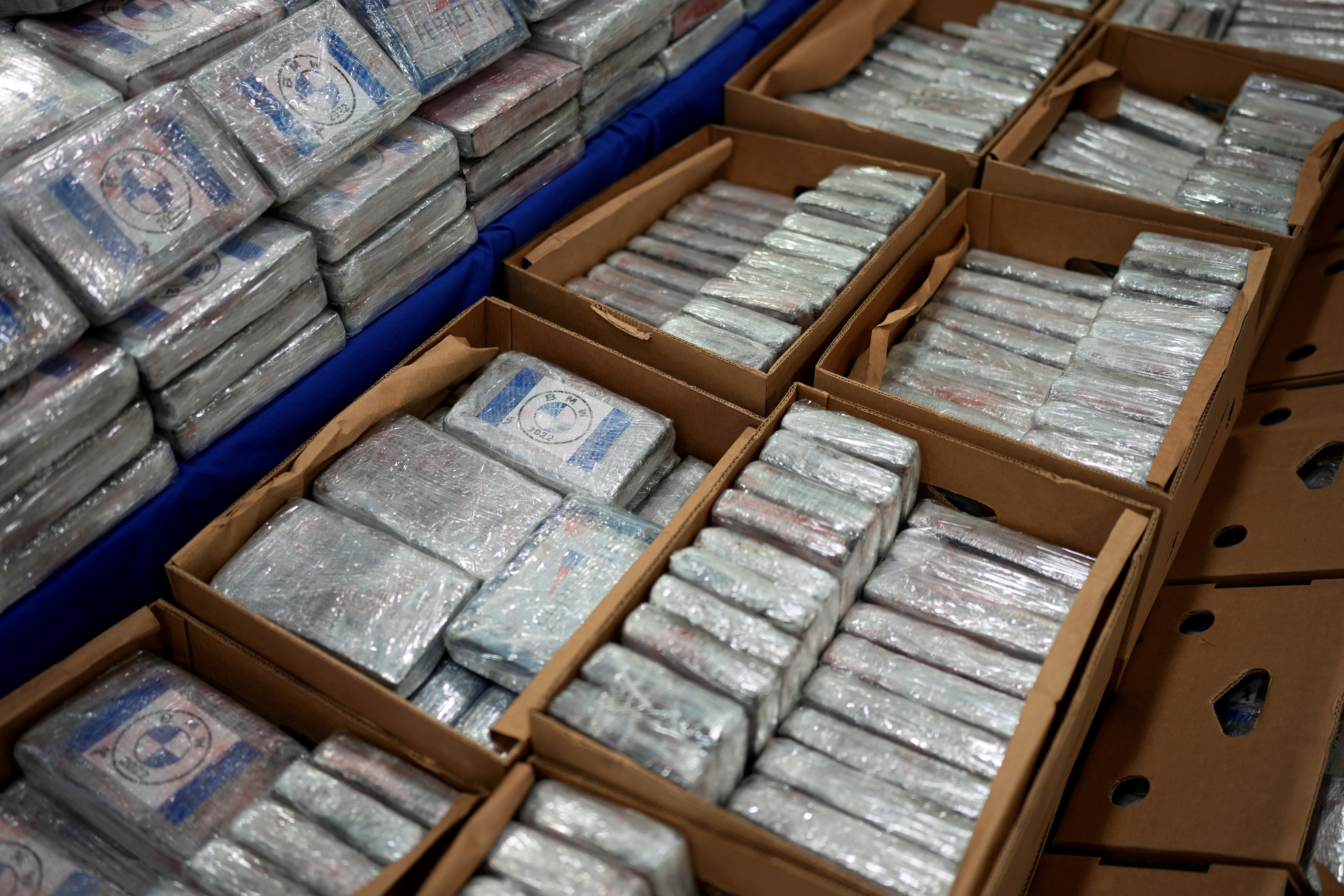UN report reveals cocaine in upward trend, meth market expands
A new UN report indicates that methamphetamine trafficking has expanded in to new markets such as the Middle East and West Africa.
-

Packets with cocaine are displayed for the media at the Portuguese police headquarters in Lisbon, Tuesday, May 2, 2023 (AP)
A report by the UN Office on Drugs and Crime (UNODC) revealed, in its annual World Drug Report published on Sunday, that the Cocaine market has been in an upward trend, worldwide, while methamphetamine trafficking has expanded beyond previously established markets.
The report highlighted that the Coca bush cultivation and total cocaine production reached record highs in 2021, while the number of cocaine users, globally, has been estimated at 22 million that same year, continued to grow steadily.
It is important to note that 2021 has been the most recent year for which such data is available.
The report underscored that despite increased production, it has been recorded that the seizure of cocaine has surpassed the production rate. In a way, this has allowed for the relative containment of the total supply.
"The world is currently experiencing a prolonged surge in both supply and demand of cocaine, which is now being felt across the globe and is likely to spur the development of new markets beyond the traditional confines," the UNODC report said.
Moreover, the report also stated that "Although the global cocaine market continues to be concentrated in the Americas and in Western and Central Europe (with very high prevalence also in Australia), in relative terms it appears that the fastest growth, albeit building on very low initial levels, is occurring in developing markets found in Africa, Asia and South-Eastern Europe."
While East and Southeast Asia and North America accounted for about 90% of the methamphetamine seized across the globe, the seizure data indicated that those markets have stabilized at a high level while trafficking has expanded in other geographic regions, such as the Middle East and West Africa.
"Questions remain regarding the linkages between illegal manufacture of heroin and of methamphetamine (in Afghanistan) and whether the two markets will develop in parallel or whether one will substitute the other," it added.
It went on to say that reports and seizures concerning methamphetamine made in Afghanistan indicated that the drug economy transformed.
In 2021, the report stated, about 80% of the world's illicit opium poppy was produced in Afghanistan.
Opium cultivation shrunk by 80 percent under Taliban: The Spectator
A report by Niko Vorobyov for The Spectator details the drastic changes that are taking place in the narcotic industry amid the Taliban's efforts to phase out the illicit narcotics trade, particularly with regard to the production of morphine and opium-related products.
According to the report, it took only one year for the Taliban to eradicate about 80 percent of opium cultivation, something which the UK and the US were both either unable or unwilling to fulfill when troops occupied the country.
"They sure showed us up," Vorobyov writes. "In 2001, Tony Blair said stopping Afghan heroin from reaching British shores was one of the main reasons for sending in troops to oust the Taliban."
"The Taliban, it seems, achieved what two decades of our occupation could not," he adds.
As Afghanistan once supplied 82 percent of the world's opium, does that mean that there will be fewer drugs will be circulating in the market, he asks?
The obvious answer is no. Research has shown us that when one supplier is eliminated, another will quickly fill the shoes, and oftentimes the quality or strength is unknown -- leading to higher instances of drug overdoses.
Moreover, the drug trafficking of narcotics was strategic in disrupting communities that were anti-Status Quo, such as Black resistance movements in the US during the 1960s, or the hippies who voiced their opposition against the Vietnam War.
The Taliban attempted to implement rehabilitation programs via "prison-like detox centers," but the attempt apparently failed as addicts returned to the streets.
With less morphine being produced, traffickers are opting for the production of stronger and more lethal alternatives, such as fentanyl or tranq dope.
Besides having a strong potential for dependency and abuse, the production of these new drugs involves fewer risks as they get to be produced synthetically in labs.
In sum, the Taliban's crackdown on poppy farmers may soon aggravate the drug crisis, and cause more harm than good to the West.
Read more: People who use ADHD drugs worse at basic tasks: Study

 4 Min Read
4 Min Read









